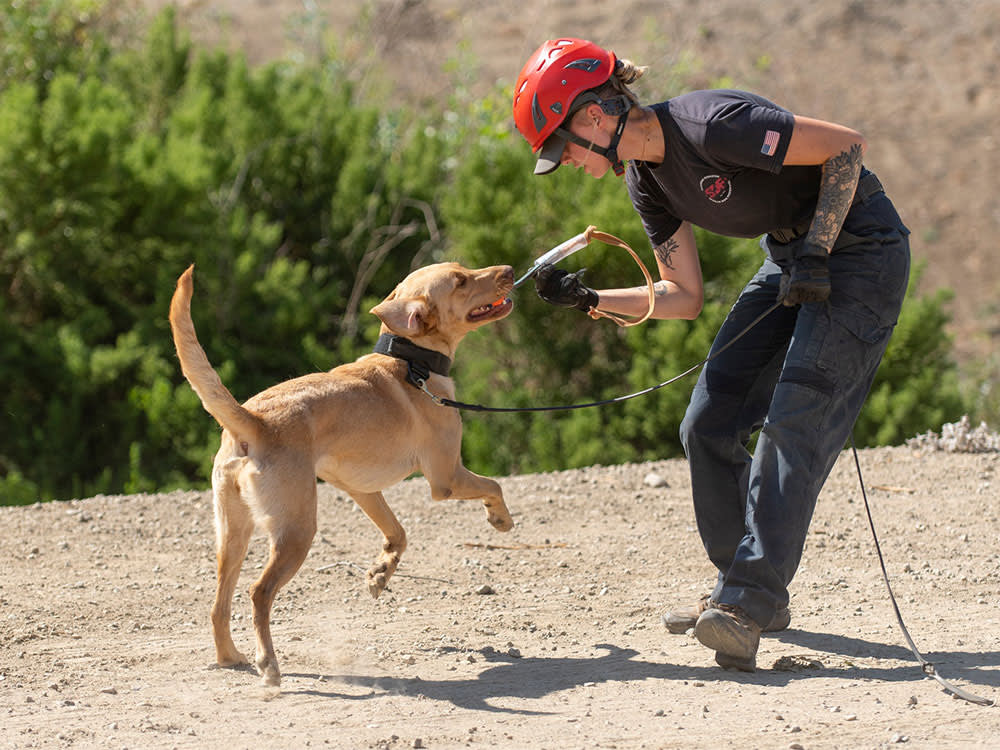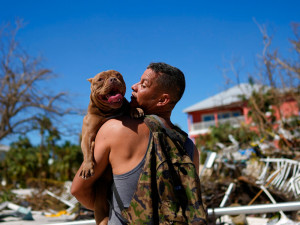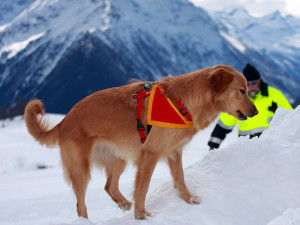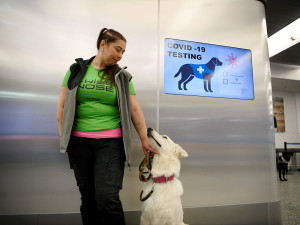Once Surrendered Shelter Pups Save Lives as Search-and-Rescue Dogs
Learn how the National Disaster Search Dog Foundation trains abandoned shelter pups to become SAR dogs.

Share Article
Cody was an uncontrollable puppy nobody wanted. But now, the spirited Golden Retriever is one of the most highly trained search dogs in the country. The nine-year-old Golden, who nearly lost his life in a Wisconsin animal shelter, is now part of an elite group of emergency workers specially trained to respond to disasters and find people buried alive. Cody’s tale, however, would undoubtedly have had a different and tragic ending if an organization called the National Disaster Search Dog Foundationopens in new tab (SDF) in Ventura County, Calif., hadn’t stepped in and taught him how to use his boundless energy to save lives.
Finding search-and-rescue dogs
“He is the luckiest dog in the world,” says handler Linda D’Orsi, a captain with the Chula Vista, Calif., fire department. “It could have been the end for him in the shelter in Wisconsin.” Cody lived with six different families before his first birthday. Each brought him back to the shelter because he had too much energy — they couldn’t control him. “He was a throwaway dog,” D’Orsi says. “He probably would have been put to sleep if someone hadn’t seen his potential.”

Save on the litter with color-changing tech that helps you better care for your cat.
That someone was Dawn Christenson, a volunteer with Golden Retriever Rescue of Wisconsin (GRROW). She understood that Cody’s endless energy and strong play drive made him an excellent candidate for search-and-rescue work. “Cody was not your average Golden,” she says. “He was a Golden who needed a job.”
But where would this feisty dog find one? The answer to that question was provided by the Search Dog Foundation, which works exclusively with rescued dogs and trains them to find people who are lost or buried alive. Christenson contacted the organization about Cody, and her call saved his life. “The day after Dawn’s call, Cody was on a plane heading to the foundation’s training facility in Gilroy, Calif.,” D’Orsi explains.
The Search Dog Foundation has trained 229 canine search-and-rescue teams across the country with advanced certification from the Federal Emergency Management Agency (FEMA). This certification, the pinnacle achievement for search and rescue dog teams, means that these pups can respond to any disaster. Not a bad feat for a dog nobody wanted.
Search-and-rescue training
Tales like Cody’s aren’t unusual for SDF. Since retired schoolteacher Wilma Melville founded the Search Dog Foundation in 1996, she and her staff have worked with scores of dogs from shelters and breed rescue groups, turning them into highly trained search dogs.
The desire to help people — particularly those injured during a disaster or terrorist attack — was the motivating force behind Melville’s decision to establish the Search Dog Foundation. Her inspiration came when she and her dog Murphy responded to the 1995 bombing of the Alfred P. Murrah Federal Building in Oklahoma City.
“That bombing opened my eyes to the national need for certified canine search teams,” Melville says. “When that happened, there were only 15 of these teams in the nation.” Melville decided to fill the void. “I knew how to train a dog — I had a relationship with a trainer, and I knew if I put my mind to it, we could come up with a faster, better, and more cost-effective way to do this.” Back then, Melville says, it took a dog and handler about three to four years to become FEMA-certified. SDF has slashed that time in half.
Now, she says, “It takes six to eight months to train the dogs. The dogs are then assigned to their handlers, and it takes them about a year to get ready for the FEMA test. There’s no other organization that does what we do the way we do it. We give highly trained dogs to firefighters at no cost at all to them or their departments, and we stay with them throughout their careers.”
The foundation doesn’t receive government funds to cover the more than $10,000 required to train each team and provide lifetime care for the dog. As a nonprofit organization, the SDF pays those costs with donations from individuals and foundations. “We’ve actually been the leader in this field and instrumental in greatly increasing the number of canine search teams out there,” Melville says.
SAR dog certification
The Search Dog Foundation opened its 125-acre national training center in California for handlers and dogs in 2011. SDF also has a group of volunteers who comb animal shelters for potential dogs. “If we can find the characteristics we’re looking for in a rescued dog, then we’re relieving the pet overpopulation problem. And we’re giving these high-energy dogs — who are difficult for most families to adopt — a job,” says Melville.
The organization now has 78 search teams. The FEMA certification standard that many have is what sets these search and rescue teams apart from others trained in water, avalanche, cadaver, or wilderness search. And unlike other dogs in public service, disaster search dogs must attain this certification to do their jobs.
FEMA Type One Advanced Certification is the highest level of urban search certification recognized in the U.S. To pass the advanced FEMA certification test, a dog must search two piles of rubble and find four to six victims. The dogs have only 20 minutes to complete this mission, and the testers try to distract them. For example, they may put food, live chickens, or even cats in piles of rubble. If the dogs become distracted, they fail the test.
“Our mission is to strengthen the disaster response in America,” Melville says. “It’s not that we do it all. We are one piece of the disaster network.” Search Dog Foundation’s teams have deployed as first responders to urban emergencies across the board — including such crises as earthquakes, mudslides, hurricanes, building collapses, missing children, derailed trains, and, of course, the 9/11 attacks.
“I’m proud of having come up with this organization,” Melville says. “I never started this by saying I’m going to change the way of doing disaster searches in this country. But people have watched our successful methods and emulated many of them.”
Firefighters like D’Orsi applaud Melville’s commitment to them, to the dogs, and to helping those in need. “Cody has become like a mentor dog,” D’Orsi says. “He helps with training and works with the new handlers before they get their dogs. They get to work with Cody because you can’t ruin him by making a mistake or two. He knows the system so well.” It’s a remarkable transformation for the once-unruly puppy.
“Cody still has all that energy, but it’s now directed,” D’Orsi says. “He’s become comfortable in his own fur and found his niche in life. And while we don’t wish harm on anyone, we’d love to get out there and help more people. We’re ready to go.”

Lisa McCormick
Lisa McCormick is an award-winning investigative reporter whose stories have appeared in Dogs for Kids magazine, The Kansas City Star, and the national consumer news website, ConsumerAffairs.com; she has written 12 nonfiction children's books.
Related articles
![Rescue dog standing in the snow with the mountains and an emergency medic in the background]()
Paw Patrol: How Avalanche Rescue Dogs Make the Slopes Safer for Everyone
Meet the pups who are saving lives, one rescue at a time.
![Woman wearing a neon green t-shirt, black pants, and a grey vest gesturing to a white dog on a leash while standing in front of a sign on a metal wall that reads "COVID-19 Testing"]()
COVID-19 Isn’t Going Anywhere. Enter Dogs Who Can Sniff It Out
The answer to every (seemingly never-ending) crisis: Dogs.
![Woman in vintage striped pants walking in park while her pet is following the trail. Cute beagle dog sniffs something on the path in morning.]()
Does Your Dog Have a Nose For Scent Training?
This sounds like a competition show waiting to happen.
![A cute dog standing outside with a leash looking up.]()
How to Protect Your Pet During LA’s Canine Crime Wave
Dognappers are targeting designer breeds like French Bulldogs. We asked a pet detective for tips on how to keep your pup safe.




